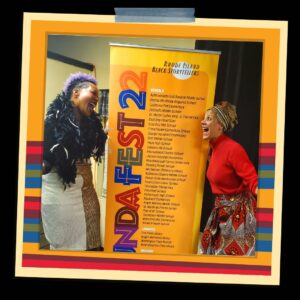July 12, 2022
Rhode Island: General Operating Support Grants

Rhode Island Black Storytellers, a RISCA grantee, next to a sign for their storytelling festival, Funda Fest. Image courtesy Rhode Island Black Storytellers; photo by Jonathan Pitts-Wiley
Rhode Island State Council on the Arts (RISCA) has been redesigning its grant programs to foster more equitable grant processes and funding outcomes. As part of this redesign, RISCA has announced two significant changes to its grant programs serving organizations and artists. General operating support (GOS) grants are flexible funding grants that allow entities to pursue their own initiatives and build capacity with more predictable funding timelines. Read more about state arts agency general operating support grants.
GOS for Organizations
RISCA’s new General Operating Support for Organizations grant replaces the previous GOS grant program, Investments in Arts and Culture, and is the result of a stakeholder-led working group. Thirty-six people from 22 Rhode Island arts and culture organizations first established policy goals to guide program revisions. These goals included providing continuity of support, prioritizing the inclusion of organizations that are culturally responsive to their communities, recruiting more diverse grantees, and achieving a just and equitable distribution of funding that directly addresses the impact of systemic racism.
To align with these goals, RISCA’s new general operating support grant provides multiyear, unrestricted funding for arts and culture nonprofit organizations, including those using a fiscal sponsor or nestled within a nonprofit or university. RISCA took a number of steps to ensure that the new program supports historically and currently marginalized organizations:
- A shorter funding history is required for Black, Indigenous and/or people of color (BIPOC)-centered organizations, other organizations representing historically marginalized communities, and organizations based in towns or cities currently unrepresented in the program.
- Grant award amounts are tiered based on applicant budgets—with awards ranging from $3,000 to $40,000—and will automatically be 1.5 times larger for organizations representing historically marginalized communities.
- The five-person panels deciding grant awards must include at least two members who identify as BIPOC and at least one member who is a practicing artist.
- 10% of panel adjudication scores are based on an applicant organization’s demonstrated commitment to diversity, equity, inclusion and access.
Going forward, RISCA has set a goal of doubling the number of operating support grants awarded to BIPOC-centered organizations by 2025, as well as increasing geographic inclusion by awarding grants to three organizations from three currently unrepresented towns. Having just announced the grant awards from the first cycle of its new GOS program, RISCA is proud to have already surpassed part of that goal, welcoming 11 BIPOC-centered organizations into the program. This is thanks to both the changed program and the work of the RI Expansion Arts Program. To ensure that the program continues to prioritize equitable outcomes, a paid, BIPOC-majority advisory group will be assembled in 2025 to review the program and suggest modifications. For more information, contact RISCA Organizations Program Director Todd Trebour.
GOS for Artists
Similar to the GOS for Organizations grant, General Operating Support for Artists replaces RISCA’s previous Artist Fellowship grant. The new GOS for Artists grant will provide a total of $18,000 in unrestricted funding to individual artists over a three-year period—a unique practice among state arts agency fellowship programs. Artists will be supported throughout the application process with a series of workshops, one-on-one meetings and drop-in office hours. The three grantees selected each year will then have further access to RISCA-led support, including networking and learning opportunities as well as quarterly meetings with their cohort of grantees.
To ensure that the panel review process reflects the diversity of artists applying, RISCA has modified the panel process to include at least two BIPOC-identifying individuals, three in-state residents and two out-of-state panelists. All five panel members will be working professionals in the arts. Criteria for the applicants focus on success as defined by the artist, personal voice and intention, and the impact on the artist’s community of practice—all principles that rethink what artistic excellence can be. For more information, contact RISCA Individual Artists Program Director Mollie Flanagan.
In this Issue
From the President and CEO
State to State
- Connecticut: Summer at the Museum
- Rhode Island: General Operating Support Grants
- Montana: Montana Circle of American Masters
Legislative Update
The Research Digest
Announcements and Resources
More Notes from NASAA
SubscribeSubscribe
×
To receive information regarding updates to our newslettter. Please fill out the form below.

